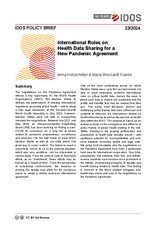Policy Brief
International rules on health data sharing for a new pandemic agreement
Holzscheiter, Anna / Maria Weickardt SoaresPolicy Brief (23/2024)
Bonn: German Institute of Development and Sustainability (IDOS)
DOI: https://doi.org/10.23661/ipb23.2024
The negotiations on the Pandemic Agreement offered a key opportunity for the World Health Organization’s (WHO) 194 Member States to address the weaknesses of existing international regulations governing global health – and to adopt a new legal instrument at the Seventy-seventh World Health Assembly in May 2024. However, Member States were not able to successfully conclude the negotiations. Between late 2021 and May 2024, an Intergovernmental Negotiating Board (INB) had been working on finding a post-COVID-19 consensus on a long list of issues related to pandemic preparedness, surveillance and response. Yet, the high hopes of many WHO Member States as well as non-state actors had given way to sober realism. The failure to reach a consensus, and to do so by the planned deadline, which was very ambitious, can be interpreted in various ways. From the point of view of diplomatic efforts as an “investment”, these efforts may be framed as a “waste of time”. From the perspective of substantial controversies, the decision to prolong the debate may allow for the necessary space to adopt a widely endorsed international agreement. One of the most contentious issues on which Member States were, up to the very last minute, not able to reach consensus concerns international rules on critical health data, namely the ways in which such data is shared and accessible and the profits and benefits that may be reaped from their use. This policy brief discusses diverse and multiplying policy frames that have influenced and continue to influence the international debate on health data sharing as well as discussions on health data within the WHO. The analysis is based on an extensive study on the emergence and diffusion of policy frames in global health starting in the mid-1990s. Pointing to the growing politicisation and polarisation in health data debates overall – with significant potential for incompatibilities and collisions between normative beliefs and legal rules, this policy brief elucidates why the negotiations on the Pandemic Agreement have been a particularly hard case for international cooperation. Over time, perspectives and positions from low- and middle-income countries have become more prominent in the debate, emphasising principles of equality and benefit sharing related to health data. This finding is mirrored in the fierce political struggles over health data norms and rules in the negotiations on the Pandemic Agreement.
Kontakt
Cornelia Hornschild
Koordinatorin Publikationen
E-Mail Cornelia.Hornschild@idos-research.de
Telefon +49 (0)228 94927-135
Fax +49 (0)228 94927-130
Alexandra Fante
Bibliothekarin/Open Access-Koordinatorin
E-Mail Alexandra.Fante@idos-research.de
Telefon +49 (0)228 94927-321
Fax +49 (0)228 94927-130



